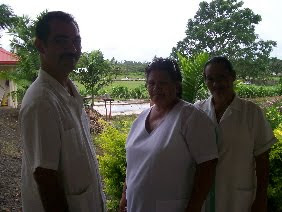Ask Fineaso what happened. A young man with a welcoming grin, Fineaso has much to smile about. He’s a newly wed and the father of a miracle child. His son Narineaso was born two days before the tsunami and the New Zealand media called him – “the youngest person to survive Samoa’s devastating Pacific Tsunami.” Yes, Fineaso may be living in a tent with no running water and wearing clothes donated by compassionate givers in faraway lands – but his cheerfulness is catching. Especially when he talks about his son. Who was renamed Tsunami after September 29th. “My uncle saved him. We were so happy and relieved that he was alright. It was a miracle.”
That day Fineaso was sleeping in one of the beach fales that the family hired out to tourists. When the wave came he ran to the back house where his sister told him to grab their eighty-five year old grandmother.
“As I reached our old lady, the wave hit us and I was trying to keep her safe. It carried us and I was trying to swim until we reached a branch and so we tried holding on to it. I told her that we’ll wait here and if the wave comes again and carries us or kills us then so be it. I was just worried that a piece of metal would pierce myself or the old lady, but it was God’s will that we were saved.”
The next wave was far more cruel. “When it came it was all black and all I saw was death coming. I grabbed the old lady and we went but there was nothing more we could do because it caught us. But I didn’t let her go…I took her with me, I held her sleeve tightly in my left hand and started swimming with my right and when we got close to the mountain, I carried her on my back.”
Fineaso’s grandmother Fuailuma Sagale, is a wizened little old lady who’s eyes cloud over when she remembers their bewildering journey in the water.“When we got to the mountain he left me there and he went to help the others. I was very worried about everyone. Oh my goodness, this was something so different from anything that has ever happened to our village. My other son helped me up to the top of the mountain and there were so many people up there, small children, elderly people and everyone was congregated there.”


